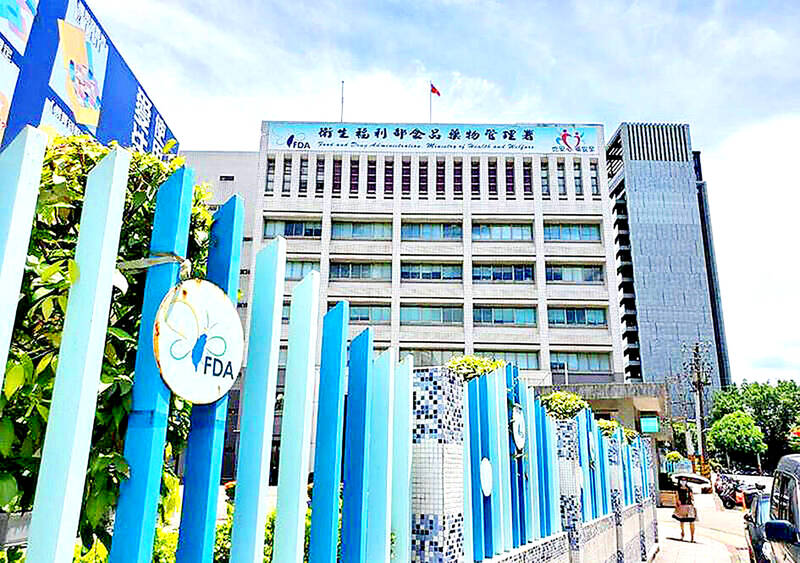The government proposed amendments that would set up an inventory control mechanism to prevent panic buying and drug hoarding following the planned withdrawal of some drugs from the Taiwanese market, Minister of Health and Welfare Shih Chung-liang (石崇良) said yesterday.
Food and Drug Administration (FDA) data showed that as of the end of last month, 47 drugs are to be withdrawn from the Taiwanese market.
Most of these drugs have alternative options, the FDA said, adding that 25 share the same ingredients, dosages and dosage forms with other generic drugs, and 21 have substitutes with the same ingredients or mechanisms.

Photo: Chung Li-hua, Taipei Times
Only one drug would stop production by the end of next year, it said.
Shih yesterday said that the FDA has submitted proposed amendments to the Pharmaceutical Affairs Act (藥事法), which would require pharmaceutical companies to report plans to discontinue a drug’s production at least six months in advance.
The amendment also seeks to authorize the FDA to control the inventory of drugs when facing a supply shortage, he said, adding that the ministry plans to initiate a special drug import project in response to the planned discontinuation of an immunosuppressive drug next year.
Although pharmaceutical companies reported that supplies of the 47 drugs would be unstable over the next six months due to reduced production or plans to exit the market, only immunosuppressive agent cyclosporine would stop being produced, Shih said.
The company would continue to supply the drug until the end of the year, he said.
Companies that produce essential medicines must report to the FDA six months in advance if they plan to reduce production or withdraw from the market, but that is not mandatory for non-essential drugs, Shih said.
Sometimes those are reported at short notice, leaving the FDA with very limited time to assess and respond to the situation, he added.
The proposed amendment includes three main points, Shih said.
First, companies that produce any type of drug would be required to report to the FDA plans to reduce or stop production at least six months in advance.
Second, the FDA would be authorized to oversee inventory control when a drug is facing potential supply shortage due to discontinuation or lower production.
Hospitals often scramble to stock up on those drugs, causing other hospitals or pharmacies to experience a shortage earlier, he said.
Third, companies would be asked whether they want to adjust their drug prices.
The National Health Insurance Administration had asked the companies producing the 47 drugs if they want to change their prices, but they said their plan to discontinue supply was due to global supply readjustment, not pricing, Shih said.
Faced with potential drug price increases due to US President Donald Trump’s new tariffs, the special resilience act has allocated NT$20 billion (US$654.8 million) for drug price adjustments, he said.
However, for long-term drug industry resilience, the ministry must boost the public’s confidence in generic drugs, he added.
Additional reporting by Chiu Chih-jou

DAREDEVIL: Honnold said it had always been a dream of his to climb Taipei 101, while a Netflix producer said the skyscraper was ‘a real icon of this country’ US climber Alex Honnold yesterday took on Taiwan’s tallest building, becoming the first person to scale Taipei 101 without a rope, harness or safety net. Hundreds of spectators gathered at the base of the 101-story skyscraper to watch Honnold, 40, embark on his daredevil feat, which was also broadcast live on Netflix. Dressed in a red T-shirt and yellow custom-made climbing shoes, Honnold swiftly moved up the southeast face of the glass and steel building. At one point, he stepped onto a platform midway up to wave down at fans and onlookers who were taking photos. People watching from inside

A Vietnamese migrant worker yesterday won NT$12 million (US$379,627) on a Lunar New Year scratch card in Kaohsiung as part of Taiwan Lottery Co’s (台灣彩券) “NT$12 Million Grand Fortune” (1200萬大吉利) game. The man was the first top-prize winner of the new game launched on Jan. 6 to mark the Lunar New Year. Three Vietnamese migrant workers visited a Taiwan Lottery shop on Xinyue Street in Kaohsiung’s Gangshan District (崗山), a store representative said. The player bought multiple tickets and, after winning nothing, held the final lottery ticket in one hand and rubbed the store’s statue of the Maitreya Buddha’s belly with the other,

‘NATO-PLUS’: ‘Our strategic partners in the Indo-Pacific are facing increasing aggression by the Chinese Communist Party,’ US Representative Rob Wittman said The US House of Representatives on Monday released its version of the Consolidated Appropriations Act, which includes US$1.15 billion to support security cooperation with Taiwan. The omnibus act, covering US$1.2 trillion of spending, allocates US$1 billion for the Taiwan Security Cooperation Initiative, as well as US$150 million for the replacement of defense articles and reimbursement of defense services provided to Taiwan. The fund allocations were based on the US National Defense Authorization Act for fiscal 2026 that was passed by the US Congress last month and authorized up to US$1 billion to the US Defense Security Cooperation Agency in support of the

‘COMMITTED TO DETERRENCE’: Washington would stand by its allies, but it can only help as much as countries help themselves, Raymond Greene said The US is committed to deterrence in the first island chain, but it should not bear the burden alone, as “freedom is not free,” American Institute in Taiwan Director Raymond Greene said in a speech at the Institute for National Defense and Security Research’s “Strengthening Resilience: Defense as the Engine of Development” seminar in Taipei yesterday. In the speech, titled “Investing Together and a Secure and Prosperous Future,” Greene highlighted the contributions of US President Donald Trump’s administration to Taiwan’s defense efforts, including the establishment of supply chains for drones and autonomous systems, offers of security assistance and the expansion of